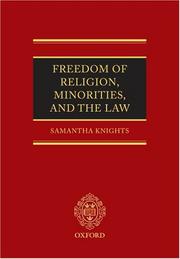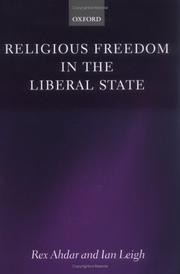| Listing 1 - 10 of 26 | << page >> |
Sort by
|
Book
ISBN: 9781509904747 1509904743 1509904751 1509904778 150990476X Year: 2020 Volume: 26 Publisher: Oxford: Hart,
Abstract | Keywords | Export | Availability | Bookmark
 Loading...
Loading...Choose an application
- Reference Manager
- EndNote
- RefWorks (Direct export to RefWorks)
Should an employee be allowed to wear a religious symbol at work? Should a religious employer be allowed to impose constraints on employees' private lives for the sake of enforcing a religious work ethos? Should an employee or service provider be allowed, on religious grounds, to refuse to work with customers of the opposite sex or of a same-sex sexual orientation? This book explores how judges decide these issues and defends a democratic approach, which is conducive to a more democratic understanding of our vivre ensemble. The normative democratic approach proposed in this book is grounded on a sociological and historical analysis of two national stories of the relationships between law, religion, diversity and the State, the British (mainly English) and the French stories. The book then puts the democratic paradigm to the test, by looking at cases involving clashes between religious freedoms and competing rights in the workplace. Contrary to the current alternative between the "accommodationist view", which defers to religious requests, and the "analogous" view, which undermines the importance of religious freedom for pluralism, this book offers a third way. It fills a gap in the literature on the relationships between law and religious freedoms and provides guidelines for judges confronted with difficult cases.
Freedom of religion --- Religious minorities --- Legal status, laws, etc. --- Freedom of religion - France --- Freedom of religion - Great Britain --- Religious minorities - Legal status, laws, etc. - France --- Religious minorities - Legal status, laws, etc. - Great Britain --- France --- Great Britain

ISBN: 9780199290628 0199290628 Year: 2007 Publisher: Oxford: Oxford university press,
Abstract | Keywords | Export | Availability | Bookmark
 Loading...
Loading...Choose an application
- Reference Manager
- EndNote
- RefWorks (Direct export to RefWorks)
Book
ISBN: 1315667177 1317357329 1317357310 9781315667171 9781317357308 1317357302 9781317357315 9781317357322 9781138953833 1138953830 9780367727284 0367727285 Year: 2021 Publisher: Abingdon: Routledge,
Abstract | Keywords | Export | Availability | Bookmark
 Loading...
Loading...Choose an application
- Reference Manager
- EndNote
- RefWorks (Direct export to RefWorks)
In contemporary pluralist states, where faith communities live together, different religious symbols and practices have to coexist. This may lead to conflicts between certain minority practices and the dominant majority, particularly around the manifestation of belief in the public domain which may be seen both by the religious and secular majorities as a threat to their cultural heritage or against the secular values of the host country. The law has to mitigate those tensions in order to protect the public from harm and preserve order but in doing so, it may where necessary have to limit citizens’ ability to freely manifest their religion. It is those limitations that have been disputed in the courts on grounds of freedom of religion and belief. Religious symbols are often at the heart of legal battles, with courts called upon to consider the lawfulness of banning or restricting certain symbols or practices.This book analyses the relationship between the state, individuals and religious symbols, considering the three main forms of religious expression, symbols that believers wear on their body, symbols in the public space such as religious edifices and rituals that believers perform as a manifestation of their faith. The book looks comparatively at legal responses in England, the U.S.A and France comparing different approaches to the issues of symbols in the public sphere and their interaction with the law. The book considers religious manifestation as a social phenomenon taking a multidisciplinary approach to the question mixing elements of the anthropology, history and sociology of religion in order to provide some context and examine how this could help inform the law.
Christian art and symbolism --- Religious minorities --- Minorities --- Art, Christian --- Art, Ecclesiastical --- Arts in the church --- Christian symbolism --- Ecclesiastical art --- Symbolism and Christian art --- Religious art --- Symbolism --- Symbolism in art --- Church decoration and ornament --- Law and legislation. --- Law and legislation --- Legal status, laws, etc. --- Christian art and symbolism - Law and legislation. --- Christian art and symbolism - Law and legislation - England. --- Christian art and symbolism - Law and legislation - France. --- Christian art and symbolism - Law and legislation - United States. --- Religious minorities - Legal status, laws, etc. --- Religious minorities - Legal status, laws, etc. - England. --- Religious minorities - Legal status, laws, etc. - France. --- Religious minorities - Legal status, laws, etc. - United States.
Book
ISBN: 9781472453464 9781472453471 9781472453488 9781315569000 9781317175315 9781317175322 Year: 2014 Volume: *2 Publisher: Aldershot [etc.] Ashgate
Abstract | Keywords | Export | Availability | Bookmark
 Loading...
Loading...Choose an application
- Reference Manager
- EndNote
- RefWorks (Direct export to RefWorks)
Sociology of religion --- Human rights --- Europe --- Freedom of religion --- Religious minorities --- Religion in the workplace --- Multiculturalism --- Legal status, laws, etc. --- Law and legislation --- Summary report on the RELIGARE project --- Freedom of religion European Union countries. --- Religious minorities Legal status, laws, etc. European Union countries. --- Religion in the workplace Law and legislation European Union countries. --- Multiculturalism Law and legislation European Union countries. --- RELIGARE Project --- Summary report on the RELIGARE project. --- RELIGARE Project. --- Legal status, laws, etc --- Freedom of religion European Union countries --- Religious minorities Legal status, laws, etc. European Union countries --- Religion in the workplace Law and legislation European Union countries --- Multiculturalism Law and legislation European Union countries
Book
ISBN: 9780754675471 0754675475 9781315250557 9781351922388 9781138267831 Year: 2009 Publisher: Farnham: Ashgate,
Abstract | Keywords | Export | Availability | Bookmark
 Loading...
Loading...Choose an application
- Reference Manager
- EndNote
- RefWorks (Direct export to RefWorks)
Sociology of minorities --- Human rights --- Religious minorities --- Legal polycentricity --- Legal status, laws, etc --- Cultural diversity --- Legal status, laws, etc. --- Bijuralism --- Legal pluralism --- Pluralism, Legal --- Polycentric law --- Polycentricity, Legal --- Law --- Conflict of laws --- Minorities --- Cultural diversity. --- Religious minorities - Legal status, laws, etc - Congresses --- Legal polycentricity - Congresses
Book
ISBN: 9781409427308 9781409427315 9781315591667 9781317107330 9781317107347 9781138261389 1409427315 1409427307 Year: 2011 Publisher: Farnham, Surrey, England: Ashgate,
Abstract | Keywords | Export | Availability | Bookmark
 Loading...
Loading...Choose an application
- Reference Manager
- EndNote
- RefWorks (Direct export to RefWorks)
Sociology of religion --- Human rights --- Sociology of education --- Religion in the public schools --- Religious minorities --- Freedom of religion --- Law and legislation --- Legal status, laws, etc. --- Europe --- Religion in the public schools - Law and legislation - Europe --- Religious minorities - Legal status, laws, etc. - Europe --- Freedom of religion - Europe --- law --- religious freedom --- education
Book
ISBN: 9789050957458 9050957455 Year: 2007 Publisher: Antwerpen: Intersentia,
Abstract | Keywords | Export | Availability | Bookmark
 Loading...
Loading...Choose an application
- Reference Manager
- EndNote
- RefWorks (Direct export to RefWorks)
252 Mensenrechten --- Nederland --- Canada --- Islam --- discriminatie --- Terrorisme --- 674 Gezondheidsrecht --- Human rights --- National security --- Religious minorities --- Congresses. --- Legal status, laws, etc. --- Minorities --- Congresses --- Legal status, laws, etc --- Human rights - Congresses --- National security - Congresses --- Religious minorities - Legal status, laws, etc --- DROIT INTERNATIONAL PUBLIC --- Droit comparé --- droits de l'homme --- sécurité --- sphère publique --- sphère privée --- Pays-Bas / Canada / Iran / Congo
Book
ISBN: 9789042921597 9042921595 Year: 2010 Volume: 7 Publisher: Leuven: Peeters,
Abstract | Keywords | Export | Availability | Bookmark
 Loading...
Loading...Choose an application
- Reference Manager
- EndNote
- RefWorks (Direct export to RefWorks)
Church and state --- Religious minorities --- Religion and law --- Legal status, laws, etc --- Minorities --- Law --- Law and religion --- Religious aspects --- Ecclesiastical law --- Great Britain --- Church of England --- Religion and state --- Church and state - England --- Religious minorities - Legal status, laws, etc - England --- Religion and law - England

ISBN: 0199253625 9780199253623 Year: 2005 Publisher: Oxford: Oxford university press,
Abstract | Keywords | Export | Availability | Bookmark
 Loading...
Loading...Choose an application
- Reference Manager
- EndNote
- RefWorks (Direct export to RefWorks)
Freedom of religion --- Religious minorities --- Church and state --- Religion and state --- Legal status, laws, etc. --- Freedom of religion. --- Religion and state. --- Sociology of religion --- Human rights --- Religious minorities - Legal status, laws, etc. --- Church and state - Great Britain --- religious freedom --- the liberal state --- religion and state --- religious minorities --- church and state
Book
ISBN: 1472453468 1472453484 1317175336 1315569000 1317175328 1472453476 9781472453464 Year: 2014 Publisher: Farnham: Ashgate,
Abstract | Keywords | Export | Availability | Bookmark
 Loading...
Loading...Choose an application
- Reference Manager
- EndNote
- RefWorks (Direct export to RefWorks)
Freedom of religion - European Union countries --- Religious minorities - Legal status, laws, etc. - European Union countries --- Religion in the workplace - Law and legislation - European Union countries --- Multiculturalism - Law and legislation - European Union countries --- Freedom of religion --- Religious minorities --- Religion in the workplace --- Multiculturalism
| Listing 1 - 10 of 26 | << page >> |
Sort by
|

 Search
Search Feedback
Feedback About UniCat
About UniCat  Help
Help News
News